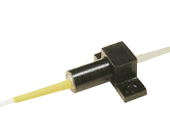Product information "TC LAB Temperature Controllers"
Output Current TEC ±10, ±15 A; Benchtop or Rack Mount; Supply Voltage 100-240 VAC; USB, Ethernet Communication Interface; Temperature Stability 0.0009°C
Wavelength Electronics’ TC LAB series of instrument type temperature controllers integrates high-end digital control with a precision output current drive stage to offer the best stability temperature control instrument commercially available today. Many different sensors can be used in the feedback loop including thermistors, RTDs, linear current and voltage sensors.
Within the TC LAB series, two models are available driving a thermoelectric or resistive heater with maximum currents of 10 A (TC10 LAB) with 15 V compliance or 15 A maximum (TC5 LAB) with 20 V compliance. The advanced and reliable circuitry of the TC LAB series instruments achieves better than 0.0009 °C temperature stability with thermistors.
Safety features protect the thermoelectric cooler [TEC] and its load. Over and under temperature limits as well as positive and negative current limits can be set. If the sensor signal is lost or a short is detected at the TEC, output current is disabled. If temperature limits are exceeded, a signal to the active load can be sent to disable its current.
For example, connect the LD Shutdown BNC output to the Active Lock input on Wavelength Electronics’ QCL LAB driver, and the QCL current will shut down if temperature limits are exceeded. An auxiliary sensor can be used to monitor the temperature of the system heatsink.
With Wavelength’s plug and play instrument, you have the ability to quickly set the controls using either the instrument touch screen or a remote computer, and results are easy to monitor. This allows taking your temperature-controlled application from the test bench to market quickly and efficiently.
Wavelength Electronics’ proprietary IntelliTune® algorithm characterizes the TEC/sensor system’s response to the controller and determines the optimal PID control coefficients. It then automatically adjusts the PID control values as setpoint, tuning mode, or bias current change.
Run IntelliTune® easily just off ambient and watch it change PID settings for a much higher or lower setpoint. After a single scan, explore either optimized setpoint response or disturbance rejection performance with your load to see which works best. Add or remove the D term to see if noise is an issue.
IntelliTune® lets you skip the manual characterization and it’s smart enough to really work—very little adjustment is needed after you have stored a successful characterization scan. See Application Note IntelliTune® vs. Conventional Autotune for an in-depth exploration.
One mating DB 15+2 thermoelectric and sensor plug is included with the instrument. As accessories, various further devices are available, like a DB9 mating connector for status/enable signals, a DB15+2 male connector with hood and high current pin inserts, full cables for the DB9 and DB15+2 or single and dual rack mount kits.
When controlling laser diode temperature, the LDMOUNT-5A, a 14-pin butterfly laser diode mount with integrated heat sinking, is available for simple connections between the instrument and the laser. If you need a lower power temperature control instrument, consider the LFI3751 series.
Free, effective and responsive technical support is available to simplify integration of Wavelength products into your OEM design. Standard products can be easily modified to meet your application requirements. Get in touch with the AMS Technologies laser diode driver experts to discuss your customized solution!
Key Features:
- Instrument Type, Benchtop Use
- Size: 89 x 221 x 450 mm
- 19" Rack Mountable, 2 U Half Rack
- Output Current up to ±15 A
- Supply Range: 100 to 240 VAC (±10%), 3A, 50 to 60 Hz
- Compliance Voltage 20 V
- Compatible With Most Sensor Types (Thermistor, RTD, IC, IR)
- Temperature Stability Better than 0.0009 °C
- Intuitive User Interface Touchscreen
- IntelliTune® PID Control, Setpoint Response or Disturbance Rejection Optimization
- Adjustable Current Limits
- Over- and Under-temperature Protection
- USB, Ethernet Interfaces
Applications: Research in Electro-optical, Medical, Spectroscopy and Defense Systems; Communications; Manufacturing; Particle and Droplet Measurement; Manufacturing Test; Airborne Instrumentation; Spectroscopic Monitors; Medical Diagnostic Equipment
| Active2: | TRUE |
|---|






